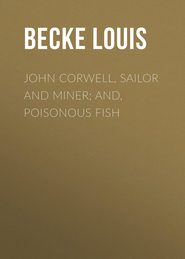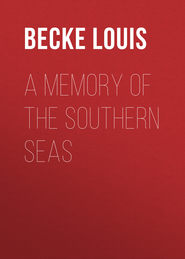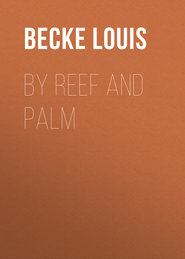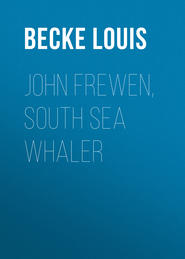По всем вопросам обращайтесь на: info@litportal.ru
(©) 2003-2024.
✖
The Strange Adventure Of James Shervinton
Настройки чтения
Размер шрифта
Высота строк
Поля
Niâbon and Lucia, I must mention, had insisted on standing watch ever since we had left Apamama, and they certainly helped us a lot, for both could now steer very well, and took pleasure in it. The former, with Tepi, was in my watch, the latter was with Tematau, who, like all Eastern Polynesians, was a good sailor-man and could always be relied upon.
We had now sailed over a thousand miles; and every day—every hour I gained more confidence in myself, and the resolution to make one of the greatest boat voyages across the Pacific had been ever strengthening in my mind since the day I looked at Chart No. 780 in Krause’s house at Taritai.
What could I not do with such a boat and two such men as Tepi and Tematau, after we had landed Lucia and Niâbon at Guam in the for north! We would refit the boat, and then turn our faces south once more, and sail back through the Western Carolines on to wild New Guinea—Dutch New Guinea, and run along the coast till we came to one of the few scattered Dutch settlements on the shores of that terra incognita. Tepi and Tematau would stick to me—they had sworn to do so—had told me so in whispers one bright night, as we three kept watch together and Lucia and Niâbon slept.
Niâbon! What a strange strange girl she was! I should find it hard to say goodbye to her, I thought; and then I felt my cheeks flush.
Say goodbye to her—part from her! Why should we part? Was I so much her superior that I need be ashamed of asking her to be my wife? What was I, anyway, but a broken man—a man whose father, my sole remaining relative, had nearly twenty years before told me with savage contempt that I had neither brains, energy, nor courage enough to make my way in the world, thrown me a cheque for a hundred pounds, and sneeringly told me to get it cashed at once, else he might repent of having given it to me to squander among the loose people with whom I so constantly associated. And I had never seen or heard from him, and never would. But I had that cheque still, for there always was in me a latent affection for the cold-faced, unsympathetic man who had broken my mother’s heart, not by open unkindness, but by what the head gardener whisperingly told me (when she was lying dead, and I, sent for from college to attend the funeral, went to his cottage to see him) was “silent, inwisible neglect, Master James; silent, inwisible neglect. That’s wot killed her.” For the servants loved my poor mother—their opinion of my father they discreetly kept to themselves. So I had kept the cheque, for burning with resentment against him as I was at the time, I remembered the words of my mother’s last letter to me, written with her dying hand.
“Try hard to please him, James. He is very cold and stern, but I am sure that, deep down in his heart, he loves you well.”
That letter, with the cheque inside it, was now yellowed, and the writing faint, but I had kept them both. I would write to him some day, I had thought, and send him back the cheque, and my mother’s letter as well, and then perhaps the hard old man would forgive me, and write and say “Come.” But the years went by, and I never wrote, and now it was too late, after fifteen had passed. Very likely he was dead, and had willed his money to churches or hospitals, or some such charities, and I should always be “Jim Sherry, the trader,” to the end of my days, and never “James Shervinton, Esq., of Moya Woods, Donegal.”
Well, after all, what did it matter? I thought, as I held on to the forestay, and looked at the now paling moon sinking low down on our lee, as the glow of the coming sun tipped a bank of cloud to windward, with a narrow wavering ribbon of shining gold. I had nothing at which to grumble. My fifteen years of wandering had done me good, although I had not saved money—money, that in my father’s eyes brought, before eternal salvation in the next world, primarily the beatitudes of some county eminence in Ireland and British respectability generally in this. Unless my father was still alive, and I could know he wanted to see me before he died, I should never go home—not after fifteen years of South Sea life.
Why should I not accept what Fate meant for me, and my own inclinations told me that I was destined for? I was intended to be “Jim Sherry, the trader,”—and I should ask “Niâbon, of Danger Island,” to be “Jim Sherry’s” wife. Why not. I had never cared for any woman before except in a fleeting, and yet degrading manner—in a way which had left no memories with me that I could look back upon with tender regrets. She and I together might do great things in the South Seas, and found a colony of our own. She had white blood in her veins—of that I felt certain—and where Ben Boyd, of the old colonial days, failed to achieve, I, with a woman like Niâbon for my wife, could succeed. Ben Boyd was a dreamer, a man of wealth and of flocks and herds, in the newly-founded convict settlement of New South Wales, and his dream was the founding of a new state in the Solomon Islands, where he, an autocratic, but beneficent ruler, would reign supreme, and the English Government recognise him as a Clive, a Warren Hastings of the Southern Seas. But the clubs of the murderous Solomon Islanders—the country of the people in which he had already planned out vast achievements on paper—battered out his brains almost under the guns of his beautiful armed yacht, the Wanderer; and the name of Ben Boyd was now alone remembered by a decayed village and a ruined lighthouse on the south headland of Twofold Bay, in New South Wales, where, in the days of his prosperity, he had erected it, as a guide to the numerous American and English whaleships, which in those times traversed the Pacific from one end to the other, and would, he imagined, eagerly avail themselves of the quiet, landlocked harbour to repair and recruit, and sell their cargoes of sperm oil. But they never came, and his dream was ended ere his life was gone.
Yes, I would ask her, as soon as I had an opportunity of speaking to her alone. It was true that she had once told me that she would never part from Lucia—and Lucia had often spoken to me of their plans for the future.
But, my vanity whispered, she would listen to me She cared for me, I was sure, and would not long hesitate. We were certain to meet with at least one missionary going through the Carolines, and he would many us. If we did not, it would not matter—there were half a dozen Spanish priests in Guam. Then after our marriage I would go on in the boat to Amboyna, where I had a business friend, a rich trader—a man who liked and trusted me, and who would give me a thousand, ay, two thousand pounds’ worth of trade goods for my pencilled I.O.U. in his notebook. Then I would buy a little schooner, and sail with Niâbon to the islands of the south-eastern Pacific, and begin trading. I would make Rapa, in the Austral Group, my head station, or else Manga Reva in the southern Paumotus—Niâbon should decide.
The low cloud to windward lifted, the red sun leapt from the sea-rim, and then I felt a soft hand on my arm.
“What are you thinking of, Jim? I called you twice, but you did not hear. I believe you were talking to yourself, for I twice saw you throw out your arm as if you were speaking to some one.”
“I believe I was, Lucia,” I replied with a laugh. “I was day-dreaming.”
“Tell me, Jim,” she said softly, so softly that her voice sank to a whisper.
“Not now, Lucia. Wait till we get to the next land.” And then in all innocence I added, as I looked at her, “How bright and happy you look, Lucia! I think you grow more beautiful every day.”
She lifted her eyes to mine for one instant, and I saw in them a light I had never seen before.
CHAPTER XIV
“Te fanua, te fanua! te fanua umi, umi lava!” (“Land, land! a long, long land!”)
As we, the “watch below”—Niâbon, Tepi, and myself—heard Tematau’s loud cry, we sat up, and saw a long, dark line pencilled on the horizon right ahead, which we knew was the great lonely atoll named Providence Island on the charts, and called Ujilon by the natives of the North-Western Pacific.
It was daylight of the sixth day out from Kusaie, and as I stood up to get a better view of the land I was well satisfied.
“We have done well,” I said exultantly to Lucia, who was steering: “three hundred and forty miles in five days—with a two-knot current against us all the way!”
I did not know my way into Ujilon Lagoon, for I had never been there before, so I now had some trouble in picking up one of the two passages on the south side of the great atoll. At seven o’clock, just as we were entering it, we saw a barque lying on the reef about half a mile away to the northward. She was a good lump of a vessel—apparently of about seven or eight hundred tons, and the remnants of some of her upper canvas still fluttered to the breeze. We could discern no sign of life about her, nor were any boats visible; but we had no time to examine her just then, so sailed on across the lagoon, and, instead of dropping anchor, ran gently on to the beach of a densely wooded island, for the water was not only as smooth as glass, but very deep, the “fall” from the edge of the beach being very steep.
In an hour we had lightened the boat sufficiently to float her along a narrow waterway, which wound a sinuous course through the solid coral rock into a little basin or natural dock, where we could board her at either low or high water, without wetting our feet, though she had a clear fathom of water under her keel.
The lagoon seemed alive with large and small fish—none of which, Niâbon said, were poisonous, like two thirds of those of the Marshall Island atolls, and the beaches and sand-flats were covered with small golden-winged plover, who displayed not the slightest fear of our presence, letting us approach them within a few yards, then rising and settling down again. From where we were we could see but seven of the chain of fifteen islands which comprised the atoll; all of these were thickly covered with coco palms, bearing an enormous crop of nuts, and here and there groves of jack-fruit and pandanus broke the monotonous beauty of the palms by their diversity of foliage.
No traces of natives were visible, though I knew that there were a few—about thirty all told—for the redoubtable Captain Bully Hayes, who claimed Ujilon as his own, and whose brig was the first ship to enter the lagoon, had I knew established friendly intercourse with them. Two years before, I had met the famous captain at Anchorite’s Islands—to the north of the Admiralty Group—when he had given me a description of Ujilon and its marvellous fertility, and had tried to induce me to go there with him with a gang of natives, and make oil for him. But although he made me a most liberal offer—he was a most delightful man to talk to, was the “South Sea pirate”—I did not trust him well enough, despite his merry, laughing blue eyes, jovial voice and handsome face, for he was a man who could be all things to all men; and the blue eyes sometimes went black, and the smooth, shapely hand that was for ever stroking the long flowing beard, liked too well to feel a trigger in the crook of its forefinger. So I laughingly declined his offer—even when, as an extra inducement, he pointed out to me a very handsome young Marshall Island girl, who would do the station honours for me at Ujilon.
“All right, Mr. Sherry,” he said, “please yourself;” and then over another bottle of wine, he gave me some further particulars about the great atoll, and told me of how it had taken him two months to get into communication with the few inhabitants; and of the particular island on which their village was concealed amid a dense grove of pandanus palms. But that was two years ago, and I had forgotten much that he had told me. However, as I intended to remain at Ujilon for two or three days, it was likely that we might come across them—they were very quiet and inoffensive people, so there was no danger to be apprehended from a meeting.
By noon we had our temporary camp made comfortable, and were having dinner when five natives made their appearance—three men and two women—coming towards us in a canoe. They landed without the slightest hesitation, and sat down with us; but we found that they spoke the Marshall Island dialect, which none of us but Niâbon could speak, and she but slightly. However, we managed to worry along, and to our surprise learned that Hayes had been at the island in his famous brig, the Leonora, only a month before, and that for a year and six months previously, seventy Line Island natives had been working on the islands under the supervision of a white man, making oil for the captain, but most of them, and the white man as well, had left the atoll in the brig, for Hayes had been so well pleased with the result of their work that he invited forty of the seventy to come on board and go with him to Ponapé, in the Carolines, for a month’s recreation and “feasting” on that beautiful island.
So with forty of his sturdy Line Islanders, and seven hundred barrels of coco-nut oil, he had sailed; and now, said our five friends, he would soon be back—perhaps in two days—perhaps in ten, or twenty, or more, for how could one tell what the winds would be? He was a good man, was the captain, but hot and sudden in his anger, over-fond of women who were good to look at, and cruel to those who sought to cross his desire; but generous—always generous—and kind to those who were weak and ill, giving them good medicine and rich food; tins of the red rich fish called samani which came from his own country, and biscuit and bread such as white men eat. Ah, he was a good man was “Puli Ese” (Bully Hayes).
“Ask them about the wretched ship on the reef,” I said to Niâbon, repeating the first question I had tried to put to them, but which they did not answer, so eager were they to tell us about Captain Hayes and themselves; “ask them all about her—when did she run ashore, and where are the crew?”
Ah, the ship, the great ship! they replied. She had run up on the reef one night four moons ago, when the sky was bright and clear, and the wind blew strongly; and when in the morning they discerned her from the village, the white man had two boats manned to go to her assistance, but as the boats approached, two cannons fired heavy balls at them from the deck of the ship; and although the white man (Hayes’s trader) tied his handkerchief to an oar and held it upright, the people on the ship continued to fire on the boats with the big cannons, and with muskets, and then, when one man was hit by a bullet and died quickly, the white man cursed those on the ship for fools, and turned the boats shoreward again, saying that those on board could perish before he would try to help them again. By sunset three boats, filled with men, had left the ship and sailed to the south. In the morning the white man (whom I knew from their description of him to be a well-known and decent South Sea trader named Harry Gardiner) boarded the ship and began to remove all that was of value on shore. Her hold was filled with all sorts of goods in barrels and cases, and when “Puli Ese” came, three months later, he was well pleased, not only for the seven hundred barrels of oil, but with the many things that had been gotten from the wrecked ship.
We promised our new friends to come up to their village—where they and about twenty of their fellow islanders lived with the remainder of Bully Hayes’s Line Island contingent—on the following day, and sent them away with a few trifling presents. As they said they could walk back, and I wanted to have a look at the wreck, they cheerfully agreed to let their canoe remain with us.
About four in the afternoon, as the heat of the sun began to relax, I determined to set out in the canoe. Tematau and Tepi had gone across to the weather side of the island with my gun to shoot plover and frigate birds, of which latter, so the natives had told us, there were great numbers to be found on the high trees to windward. Lucia and Niâbon were resting in the shade, but the latter, when she saw me pushing the canoe into the water, asked me to let her come also.
“Yes, of course; and you too, Lucia. Won’t you come as well?” I said.
“No, Jim. I feel very lazy, and I’m always so afraid of canoes,” she said with a smile, “and do be careful and not be capsized; look at all those horrid sharks swimming about—I can see nearly twenty of them from where I am sitting.”
Both Niâbon and I laughed at her fears—the sharks were not man-eaters, as we knew by their black-tipped fins, though the species were dangerous when bad weather made the fish on which they preyed scarce; then they became vicious and daring enough, and would at times actually tear the oars out of the hands of a boat’s crew. However, Lucia would not come, saying she would await the return of the men and pluck the plover which they were sure to bring back with them.
“Very well, Lucia,” I said, “we’ll leave you to yourself. I must have a look at the barque, and find out her name. Wrecks have always had an attraction for me; and, besides that, I want to get a sheet or two of copper to nail over our stem, which was badly hurt when we ran ashore in Apamama Lagoon.”
In another minute or two Niabon and I started, she sitting for’ard and I aft. The wind had died away, and the surface of the lagoon was as smooth as glass, and, through the crystal-clear water, we could discern the glories of the gorgeously-hued coral forest below. Is there such another sight in all the world as is revealed when you look down upon the bottom of a South Sea atoll.
Ah, no, there cannot be! And here as I write, there is before me the cold German Ocean, heaving and tumbling; grey, grim, and sullen under a dulled and leaden sky, and snowflakes beat and beat incessantly upon the opened windows of my room. Out upon the moor there is a flock of snow-white seagulls, driven to land by the wild weather, and as I gaze at them, fluttering to and fro, their presence seems to creep into my heart, and their wild, piping notes to say, “You will go back, you will go back, and see some of us again; not here, under cold skies, but where the bright sun for ever shines upon a sea of deepest blue.”
For half an hour or more we paddled in silence over the smooth waters of that sweet lagoon, the bow of the canoe kept steadily on towards the wrecked barque; and as I looked at the graceful figure of my companion, with her dark, glossy hair flowing over her back and swaying to and fro with every stroke, and saw the graceful poise of her head, and the backward sweep of her two little hands as she plunged her paddle into the water, and withdrew it swiftly and noiselessly, I felt that I could not, I must not delay in asking her to be my wife. Not that her physical beauty had so wrought upon my feelings—I was above that, I thank God, and a level brain—but because I felt that I loved her, ay, honestly loved her, and that she was a good and true woman, and our union would be a happy one.
It took us much longer than we anticipated in coming up to the stranded ship, or rather to the inside edge of the reef on which she lay, high and dry, half a mile further to seaward. Taking my hammer and a blunt chisel—to prize off a sheet of copper—we made the canoe fast to a coral boulder, and set off across the reef, which gave forth a strong but sickly odour caused by the heat of the sun acting on the many-coloured and many-shaped marine organisms and living coral.
Niâbon, whose feet were protected by strong takka (sandals woven of coco-nut fibre), stepped lightly and swiftly on before me; I with my heavy boots crushing into the brittle, delicate, and sponge-like coral, startling from their sunbaths hundreds of black and orange-banded sea-snakes—reptiles whose bite is as deadly as that of a rattlesnake, but which hastened out of our way almost as soon as they heard our footsteps. Here and there we had to turn aside to avoid deep pools, some of which, though not more than ten fathoms in width, were as blue as the ocean beyond, their rocky walls starting sheer up from their bases to the crust of the reef.
At last we reached the ship, and stood under her bowsprit. She was standing almost upright, wedged in tightly between three huge boulders, one on her port, and two on her starboard side, and I saw that she had struck with great violence, for just abreast of her foremast there was a jagged hole through which we could see into her lower hold. The natives had told us that there had been an unusually high tide when she ran ashore, and had it not been for her bringing up against the boulders, she might have torn her way over the reef into the lagoon, as she was under a strong press of sail, and the sea was smooth, and the stars shining brightly. Most of her copper had been stripped off by Hayes, but later on I found all I wanted by crawling under the bilge, and prizing off a few undamaged sheets.
“Let us find out her name before we go on board,” I said to my companion. “She’s a foreigner, I’m sure.”
Walking round to her stern we looked up and saw her name, Agostino Rombo, Livorno, painted in white letters.
“Ah, I thought she was a foreigner, Niabon. I fancy we shall find a strong smell of garlic as soon as we get on deck.”
Turning up along the port side, we soon found an easy way of getting on board, for just abreast of the mainmast Hayes’s Chinese carpenters had cut down the main deck from the water-ways to the bilge, so as to give free access to the upper and lower holds.
We first examined the lower hold, which contained about two hundred tons of New Caledonian nickel ore, and which, valuable as it was, Hayes had not troubled about removing. In the ‘tween deck there was nothing to show of what the main portion of her cargo had consisted—everything had been removed, and only great piles of dunnage remained, and I came to the conclusion that the Agostino Rombo of Leghorn had been bound from some Australian port to China with a general cargo, when her incapable skipper ran her ashore—to Bully Hayes’s satisfaction and benefit.
Ascending from the dark and silent ‘tween decks, where our footsteps and voices echoed and re-echoed as though we were walking and speaking in some mountain cavern, we ascended to the main deck into the fresh, sweet daylight, though the sun was now low down on the western sky, and the first thing that attracted our attention was a lengthy notice on the mainmast, carefully and neatly painted on a sheet of copper. And as I read it, I could but laugh at Captain Hayes’s natural American business instincts, combined with his usual humorous mendacity—
“Notice to Wrecking Parties.











